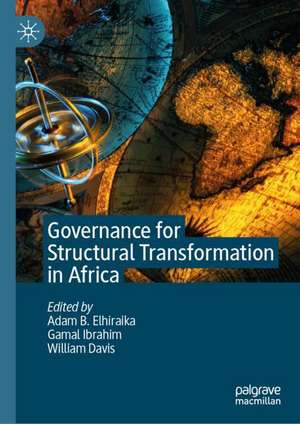Governance for Structural Transformation in Africa
Editat de Adam B. Elhiraika, Gamal Ibrahim, William Davisen Limba Engleză Hardback – 22 feb 2019
Preț: 736.50 lei
Preț vechi: 898.17 lei
-18% Nou
Puncte Express: 1105
Preț estimativ în valută:
140.93€ • 147.14$ • 116.64£
140.93€ • 147.14$ • 116.64£
Carte tipărită la comandă
Livrare economică 05-19 aprilie
Preluare comenzi: 021 569.72.76
Specificații
ISBN-13: 9783030039639
ISBN-10: 3030039633
Pagini: 175
Ilustrații: XX, 317 p. 45 illus., 32 illus. in color.
Dimensiuni: 148 x 210 mm
Greutate: 0.7 kg
Ediția:1st ed. 2019
Editura: Springer International Publishing
Colecția Palgrave Macmillan
Locul publicării:Cham, Switzerland
ISBN-10: 3030039633
Pagini: 175
Ilustrații: XX, 317 p. 45 illus., 32 illus. in color.
Dimensiuni: 148 x 210 mm
Greutate: 0.7 kg
Ediția:1st ed. 2019
Editura: Springer International Publishing
Colecția Palgrave Macmillan
Locul publicării:Cham, Switzerland
Cuprins
1. Overview - Adam B. Elhiraika, Gamal Ibrahim and William Davis.- 2: Institutional and Governance Weaknesses and African Transformation - Edward Edokat Tafah and Njong Aloysius.- 3. Sub-Regional Perspectives on Structural Change - Pedro Martins.- 4. Economic Regulation and Employment Intensity of Output Growth in Sub-Saharan Africa - Abidemi C. Adegboye, Monday I. Egharevba and Joel Edafe.- 5. Governance in the Mineral Dependent Economy: The Case of Botswana - Ita M. Mannathoko.- 6. Can Export Promotion Agencies Stem the Deindustrialisation in Sub-Saharan Africa? - Isaac Marcelin and Malokele Nanivazo.- 7. Exploring Multidimensional Fiscal Incentives and Firms’ Productivity in a Developing Country - Rapuluchukwu Efobi Uchenna, Belmondo Tanankem Voufo and Ibukun Beecroft.- 8. Food and Agriculture Global Value Chains: new evidence from Sub-Saharan Africa - Jean Balié, Davide Del Prete, Emiliano Magrini, Pierluigi Montalbano and Silvia Nenci.- 9. The Role of Regional Trade Integration and Governance in Structural Transformation: Evidence from ECOWAS Trade Bloc - Abiodun Surajudeen Bankole and Musibau Adekunle Oladapo.
Notă biografică
Dr Adam Elhiraika is Director of the Macroeconomic Policy Division of the United Nations Economic Commission for Africa (ECA). His areas of work include macroeconomic policy, development planning, economic governance and finance. Before joining ECA, he taught economics at several universities and worked for the Islamic Development Bank as a research economist. He has published extensively in internationally refereed journals and books.
Dr Gamal Ibrahim is Chief of the Finance and Private Sector Section of the Macroeconomic Policy Division of the United Nations Economic Commission for Africa. Dr. Ibrahim has published widely in books and leading economics Journals. His main field of specialization is institutional economics with a particular emphasis on economic governance, finance for development, illicit financial flows and private sector development
William Davis is Economic Affairs Officer with the Macroeconomic Policy Division of the United Nations Economic Commission for Africa.
Textul de pe ultima copertă
This book explores how better governance can help Africa to achieve structural transformation (understood to be the reallocation of factors of production across and within sectors to better support inclusive development), which history has shown to be key to sustained, inclusive growth. The book begins with a review of the existing literature on the links between governance and structural transformation and the success or otherwise of various sub regions in achieving structural transformation. It continues with a range of contributors addressing original empirical research on the relationships between different approaches to institutions and trade and industrial policies and structural transformation in Africa. The book makes recommendations for a new approach to governance in Africa that can deliver the structural transformation that the continent needs for Africans to enjoy shared prosperity, poverty reduction and development.
Caracteristici
Addresses the main challenges that face Africa in terms of economic development Focuses on the importance of institutional effectiveness, combined with robust economic management and governance Considers the necessary structural transformations required for Africa's economic growth
